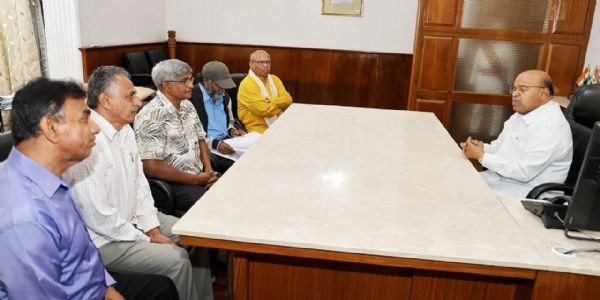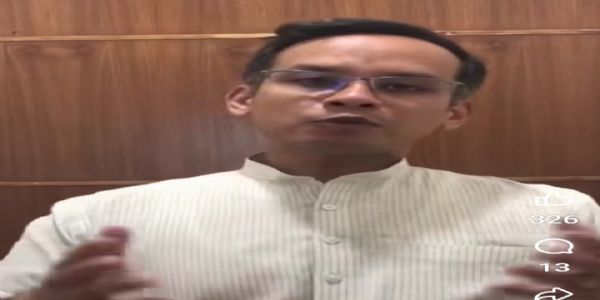
Bhubaneswar, 13 June (H.S.): The Saraswati Shishu Vidya Mandirs, operated by Vidya Bharati and the Shiksha Vikas Samiti in Odisha, play an unparalleled role in shaping the new generation through Bharatiya padhhati, value-based quality education, and by making education accessible to the general public. These institutions are set to continue their essential role in the reconstruction of Odisha in the future. To this end, there is a need to establish similar temple-like institutions in every panchayat. Union Education Minister Dharmendra Pradhan made this statement during the closing ceremony of the “Regional Pradhan Acharyas’ Conference,” organised by Vidya Bharati and the Shiksha Vikas Samiti at the Saraswati Vidya Mandir in Gatiroutpada, Cuttack district.
He remarked that many great personalities fought and sacrificed their lives to secure India's freedom. It later became clear that to sustain this freedom in society, the creation of responsible citizens was crucial. With this vision, the Rashtriya Swayamsevak Sangh (RSS) has dedicated itself to nation-building and character development for the past hundred years. As a result of this philosophy, Vidya Bharati has emerged as a successful organisation.
Dharmendra Pradhan noted that when an organisation has a clear purpose, vision, and direction, achieving its goals becomes feasible. In this spirit, Vidya Bharati has been working nationwide for the past 75 years, while in Odisha, the Shiksha Vikas Samiti has been developing Saraswati Shishu Vidya Mandirs for the past 50 years. Thanks to the values and culture imparted by the Pradhan Acharyas of these institutions, Shishu Vidya Mandirs have truly become temples of learning today.
He added that in accordance with the National Education Policy (NEP) 2020, today's conference marks a welcome step towards enhancing the quality of education within Saraswati Shishu Vidya Mandirs.
Mr. Dharmendra Pradhan stated that the Shishu Mandirs serve as the “Spandan” (heartbeat) of Odisha’s education system. The students of Saraswati Shishu Vidya Mandirs are excelling in the Class 10 board exams as well as in various competitive and merit-based examinations, which is highly commendable. He emphasised that Vidya Bharati has the potential to act as a catalyst for transformation in Odisha, as every significant change begins with a small institution. Saraswati Vidya Mandirs will function like a microscope in shaping Indian students to become cultured and self-respecting individuals.
He further stated that the education policy introduced in India by T.B. Macaulay was a deliberate strategy to undermine the country, aimed at mentally enslaving India. As an alternative, under Prime Minister Narendra Modi's leadership, a new National Education Policy has been introduced. Its objective is to replace Macaulay's colonial mindset with a self-reliant and independent Indian perspective.
The ideals of Vidya Bharati have been incorporated into the National Education Policy, which the Government of Odisha has implemented in the current academic session. Alongside quality education, Saraswati Vidya Mandirs also provide various forms of social education.
These institutions primarily provide education in four languages: Hindi (the mother tongue), English, and Sanskrit. In remote regions of the state, however, education must be delivered in the local language, as a child’s intellectual growth, critical thinking, and research abilities can only truly develop through learning in their mother tongue.
Mr. Pradhan stated that in the coming days, education will be offered in all Indian languages. The Modi government is committed to establishing a mother tongue-based education system. Furthermore, in line with the recommendations of the National Education Policy (NEP), the government is working to ensure that all school-age children receive education at least up to the 12th grade, with a strong emphasis on skill development.
He also mentioned that special attention will be given to tools like ChatGPT and Artificial Intelligence (AI) in the future, integrating AI into the expansion of knowledge. He noted that AI tools have become highly influential in today's era, and it is essential to train both Indian students and teachers in their use. In the current budget, a plan has been announced to establish a Centre of Excellence for Artificial Intelligence in the education sector, with an investment of ₹500 crore.
Artificial Intelligence will be utilised in Indian schools to enhance the connection between students and their curriculum, as well as to help teachers engage with subjects such as art, literature, knowledge, and modern science. Plans will also be developed to facilitate knowledge exchange between different states. As a result, the government is placing significant emphasis on AI education in both the school and higher education sectors.
S
Hindusthan Samachar / Monalisa Panda








